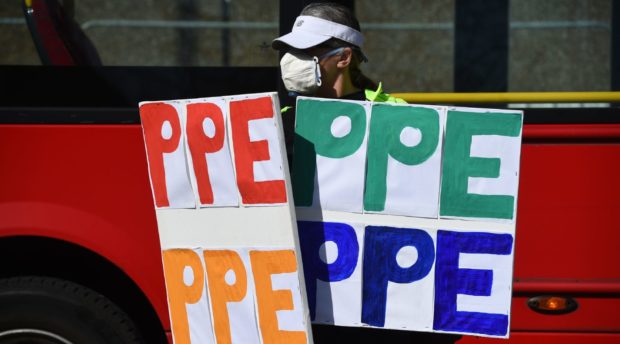Boris Johnson’s respite from the political tumult has been brief; barely a week into his convalescence after a near death experience with Covid-19, the prime minister finds himself at the centre of a storm.
Although he remains removed from his duties while he recovers, he is facing mounting criticism over his handling of the coronavirus.
In particular, attention has focused on his absence from early Cobra meetings, when the government’s response to the disease was first discussed.
As the PM still cannot speak for himself, his colleagues have expressed outrage on his behalf, with Michael Gove describing criticism of his leadership as “grotesque” and Defence Secretary Ben Wallace dismissing the claims that he skipped the sessions as “nonsense”.
Johnson may not have attended Cobra but, said Wallace, a Cobra veteran, it is normal for another Cabinet minister to chair the briefings.
Cobra is not really the point, but it provides a convenient excuse to have a go at Johnson now he is out of the woods, health-wise.
Opposition politicians, who must feel they have endured an uneasy truce for long enough, leapt at the allegations when they appeared in a Sunday newspaper.
Critics – from the former head of the civil service and now crossbench peer Sir Bob Kerslake to Tony Blair – have been queueing up in the past few days, either to demand an inquiry into the government’s coronavirus strategy or to lash out at Johnson personally.
Inevitably, there have also been calls from the usual quarters to put Brexit on the back-burner, and in Scotland to push ahead with an independence referendum.
All this is just another sign that politicians lead insular lives – even more so at the moment – and frequently misjudge the public mood.
A YouGov poll last Friday found two-thirds (66%) of Britons still believe the government is managing the crisis well.
While there will certainly be some support for the renewed assault on the prime minister, most people in this country would rather beat the virus than fight another general election.
Now, when we are still very much in the midst of the pandemic, is not the time for an inquest into government failings.
And nor is it the right moment to reopen recent wounds over Europe or reignite constitutional battles over the future of the UK.
That doesn’t mean ministers can’t be scrutinised – they are every night in the live press briefings and will be as Parliament resumes, albeit virtually, this week.
But the focus must be on continuing to contain Covid-19 – and the recent evidence, with new cases falling, suggests we have hit the peak and are over the worst.
It is too soon to judge our performance in relation to other countries, based only on the rate of infections and fatalities.
Besides, the priority now should be exiting the lockdown, not on recriminations, although in due course we will hopefully be able to learn from nations that fared better.
As for easing the restrictions, our state of limbo may be frustrating but it is hardly surprising.
Decisive leadership, seen in France over the weekend, is lacking here for the obvious reason that our premier is out of action.
No one has emerged from his team – although Gove might if offered the chance – as a credible replacement, and the impression is of understudies not yet ready for their big break.
Even an old hand – and Johnson, in Number 10 for just a few months, doesn’t fit the bill either – would struggle to combat so existential a threat to the nation’s wellbeing.
As it is, and through no fault of their own, we are being led by a collective and may be for the foreseeable future, given the lengthy rehabilitation Johnson needs.
This, like everything, is unprecedented, but not necessarily a disaster. Decisions and progress are being made.
A nationwide taskforce of vaccinologists has been set up with government funding and chief scientific adviser Sir Patrick Vallance at the helm. The prospect of a lifesaving jab being developed in a matter of months is on the horizon.
And the PPE scandal is being addressed at last, by the appointment of Lord Deighton, the brains behind the London Olympics, to oversee supplies.
This does not absolve the government from its blunders, and the learning curve for ministers is still steep.
As Gove told the BBC’s Andrew Marr: “All governments make mistakes, including our own. We seek to learn, and to improve every day.
“It is the case, I’m sure, at some point in the future that there will be an opportunity for us to look back, to reflect and to learn some profound lessons.”
For now, the blame game can wait. The Cabinet might not inspire confidence but they are the best Cabinet we have.



